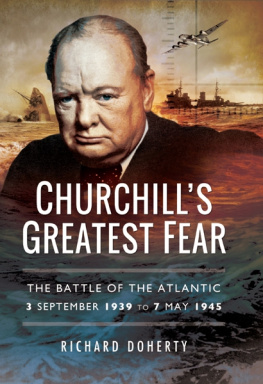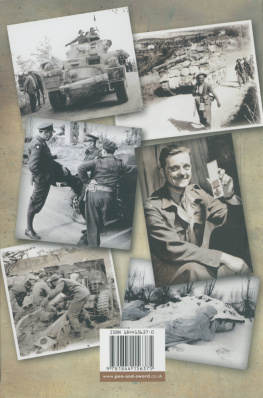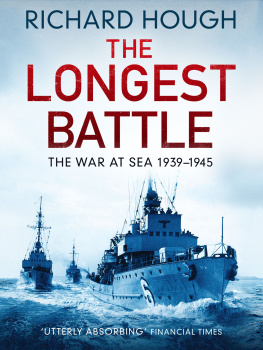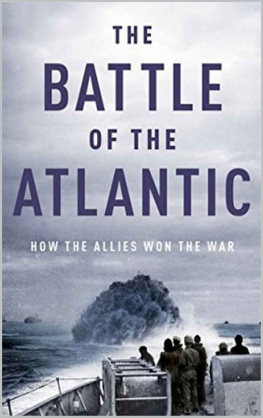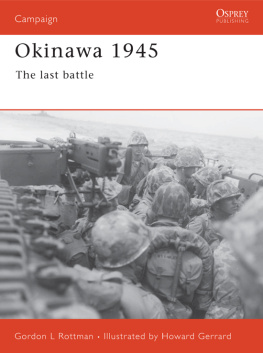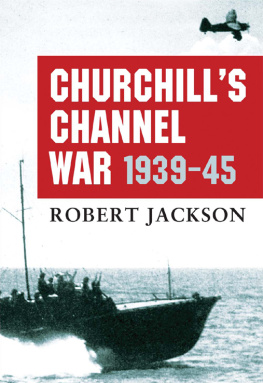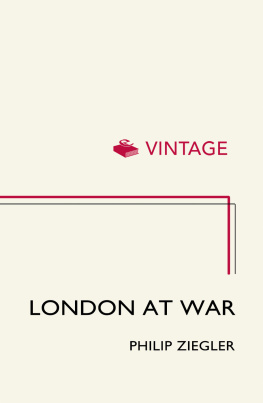By the same author
Wall of Steel: The History of 9th (Londonderry) HAA Regiment, RA (SR); North-West Books, Limavady, 1988
The Sons of Ulster: Ulstermen at War from the Somme to Korea: Appletree Press, Belfast, 1992
Clear the Way! A History of the 38th (Irish) Brigade, 19411947; Irish Academic Press, Dublin, 1993
Irish Generals: Irish Generals in the British Army in the Second World War; Appletree Press, Dublin, 1993
Only the Enemy in Front: The Recce Corps at War, 19401946; Tom Donovan Books, London, 1994
Key to Victory: The Maiden City in the Second World War; Greystone Books, Antrim, 1995
The Williamite War in Ireland, 16891691; Four Courts Press, Dublin, 1998
A Noble Crusade: The History of Eighth Army, 19411945; Spellmount, Staplehurst, 1999
Irish Men and Women in the Second World War; Four Courts Press, Dublin, 1999
Irish Winners of the Victoria Cross (with David Truesdale); Four Courts Press, Dublin, 2000
Irish Volunteers in the Second World War; Four Courts Press, Dublin, 2001
The Sound of History: El Alamein 1942; Spellmount, Staplehurst, 2002
The North Irish Horse: A Hundred Years of Service; Spellmount, Staplehurst, 2002
Normandy 1944: The Road to Victory; Spellmount, Staplehurst, 2004
Irelands Generals in the Second World War; Four Courts Press, Dublin, 2004
The Thin Green Line: A History of the Royal Ulster Constabulary GC, 19222001; Pen & Sword, Barnsley, 2004
None Bolder: A History of 51st (Highland) Division, 19391945: Spellmount, Staplehurst, 2006
The British Reconnaissance Corps in World War II; Osprey Publishing, Oxford, 2007
Eighth Army in Italy: The Long Hard Slog; Pen & Sword, Barnsley, 2007
The Siege of Derry 1689: The Military History; Spellmount, Stroud, 2008
Only the Enemy in Front: The Recce Corps at War, 194046 (revised p/bk edn); Spellmount, Stroud, 2008
Ubique: The Royal Artillery in the Second World; Spellmount, Stroud, 2008
Helmand Mission: With the Royal Irish Battlegroup in Afghanistan, 2008; Pen & Sword, Barnsley, 2009
In the Ranks of Death: The Irish in the Second World War; Pen & Sword, Barnsley, 2010
The Humber Light Reconnaissance Car 194145; Osprey Publishing, Oxford, 2011
Hobarts 79th Armoured Division at War: Invention, Innovation and Inspiration; Pen & Sword, Barnsley, 2011
British Armoured Divisions and Their Commanders 19391945: Pen & Sword, Barnsley, 2013
Victory in Italy: 15th Army Groups Final Campaign; Pen & Sword, Barnsley, 2014
First published in Great Britain in 2015 by
Pen & Sword Military
an imprint of
Pen & Sword Books Ltd
47 Church Street
Barnsley
South Yorkshire
S70 2AS
Copyright Richard Doherty 2015
ISBN: 978 1 47383 400 2
PDF ISBN: 978 1 47387 942 3
EPUB ISBN: 978 1 47387 941 6
PRC ISBN: 978 1 47387 940 9
The right of Richard Doherty to be identified as the Author of this Work has been asserted by him in accordance with the Copyright, Designs and Patents Act 1988.
A CIP catalogue record for this book is available from the British Library
All rights reserved. No part of this book may be reproduced or transmitted in any form or by any means, electronic or mechanical including photocopying, recording or by any information storage and retrieval system, without permission from the Publisher in writing.
Typeset in Ehrhardt by
Mac Style Ltd, Bridlington, East Yorkshire
Printed and bound in the UK by CPI Group (UK) Ltd,
Croydon, CRO 4YY
Pen & Sword Books Ltd incorporates the imprints of Pen & Sword Archaeology, Atlas, Aviation, Battleground, Discovery, Family History, History, Maritime, Military, Naval, Politics, Railways, Select, Transport, True Crime, and Fiction, Frontline Books, Leo Cooper, Praetorian Press, Seaforth Publishing and Wharncliffe.
For a complete list of Pen & Sword titles please contact
PEN & SWORD BOOKS LIMITED
47 Church Street, Barnsley, South Yorkshire, S70 2AS, England
E-mail: enquiries@pen-and-sword.co.uk
Website: www.pen-and-sword.co.uk
Dedication
For all who served in the Battle of the Atlantic,
especially those who lost their lives.
Twilight and evening bell
And after that the dark!
And may there be no sadness of farewell
When I embark.
Contents
Maps
Illustrations
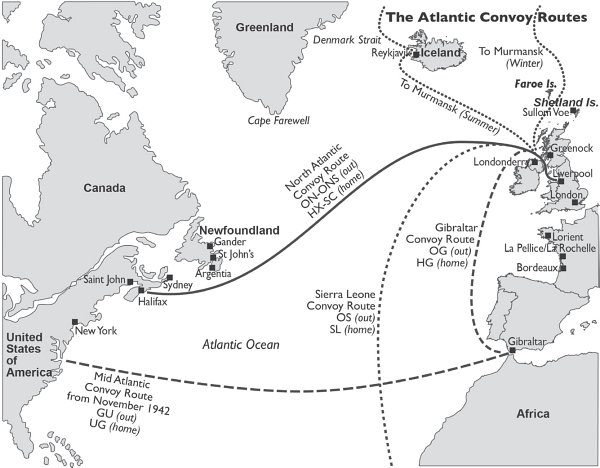
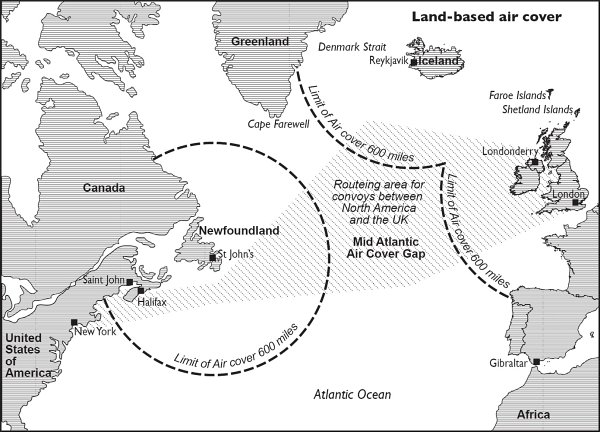
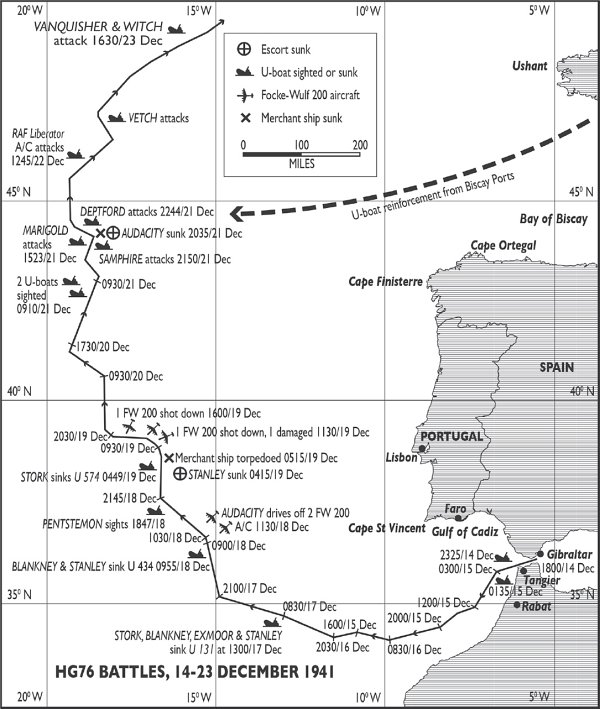
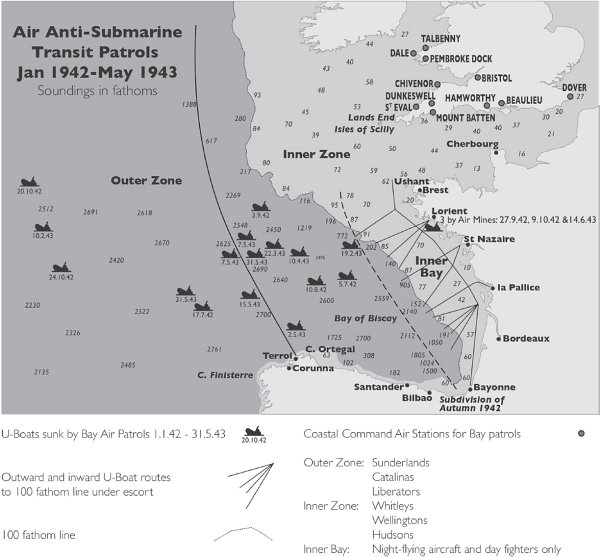
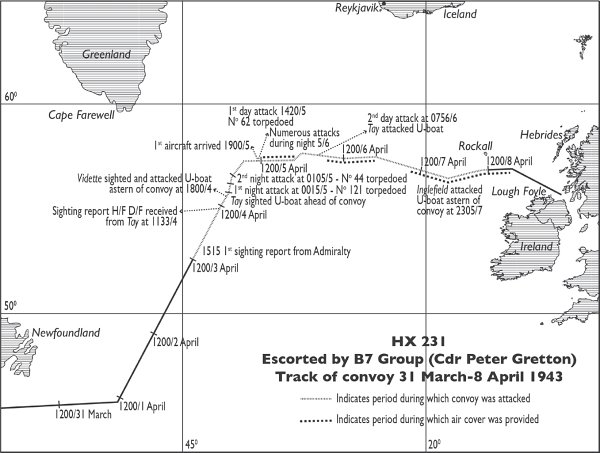
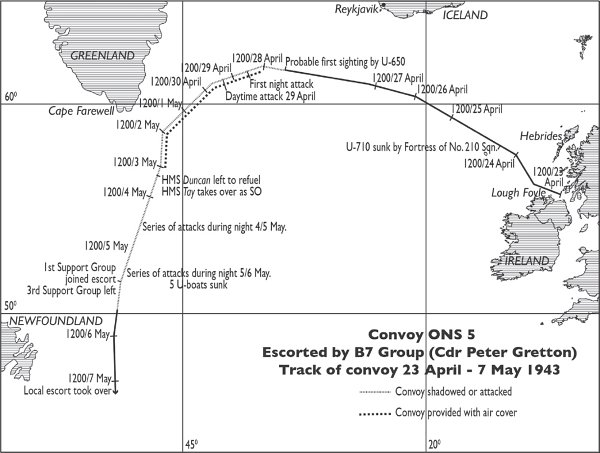
Introduction
T he only thing that ever really frightened me during the war was the U-boat peril. So wrote Winston Churchill of the naval campaign in which Germanys submarine, or U-boat (Unterseeboote), fleet threatened to destroy the United Kingdoms maritime lifelines to North America, the Commonwealth and Empire.
Britain has always relied on merchant ships to sustain life and commerce. During the First World War, Germany came close to defeating Britain through a campaign of submarine warfare in the first Battle of the Atlantic. Lessons were learned: the importance of aircraft flying boats and airships played a critical part in defeating the U-boats: the importance of the merchant marine was emphasized; without it Britain could neither pursue a land war in Europe nor be assured of survival.
The Admiralty re-introduced the convoy system as war loomed in 1939 and took control of the Merchant Navy on 26 August, but the Royal Navy was otherwise not well prepared. The large numbers of escort ships necessary to protect convoys were lacking and few aircraft were available for escort duties. Although the Admiralty later assumed operational control of Coastal Command, the Cinderella of the RAFs operational commands had to make do with stop-gap aircraft unsuited to the tasks assigned to them.
Hitlers Germany should have appreciated the potential of submarines, but other than a few naval officers, the high command was blind to the strategic possibilities of submarine warfare. Hitler failed to see that the U-bootwaffe could be a war-winning weapon. Thus, in 1939, Germany had only a small U-boat fleet and a maritime policy that placed more importance on surface ships, a shortsightedness that deprived the Third Reich of its best chance of defeating Britain since most of what Britain needed for basic survival was imported.
Germany entered the war with fewer than fifty U-boats, including short-range coastal boats unable to operate in the Atlantic. Germanys maritime threat rested on surface raiders, aircraft and U-boats. In spite of the German reputation for thorough planning, those elements were unco-ordinated. Even the Kriegsmarines small U-boat fleet inflicted severe damage on Britains merchant shipping and on the Royal Navy and held the advantage until May 1943, when the balance swung against them through the conflation of several factors tactics, escort ships, air cover, weaponry, detection systems, operational research, plus the courage and dedication of merchant seamen and the crews of the Allied navies. May 1943 was not the end. The Battle of the Atlantic raged until the last days of war. The
Next page
